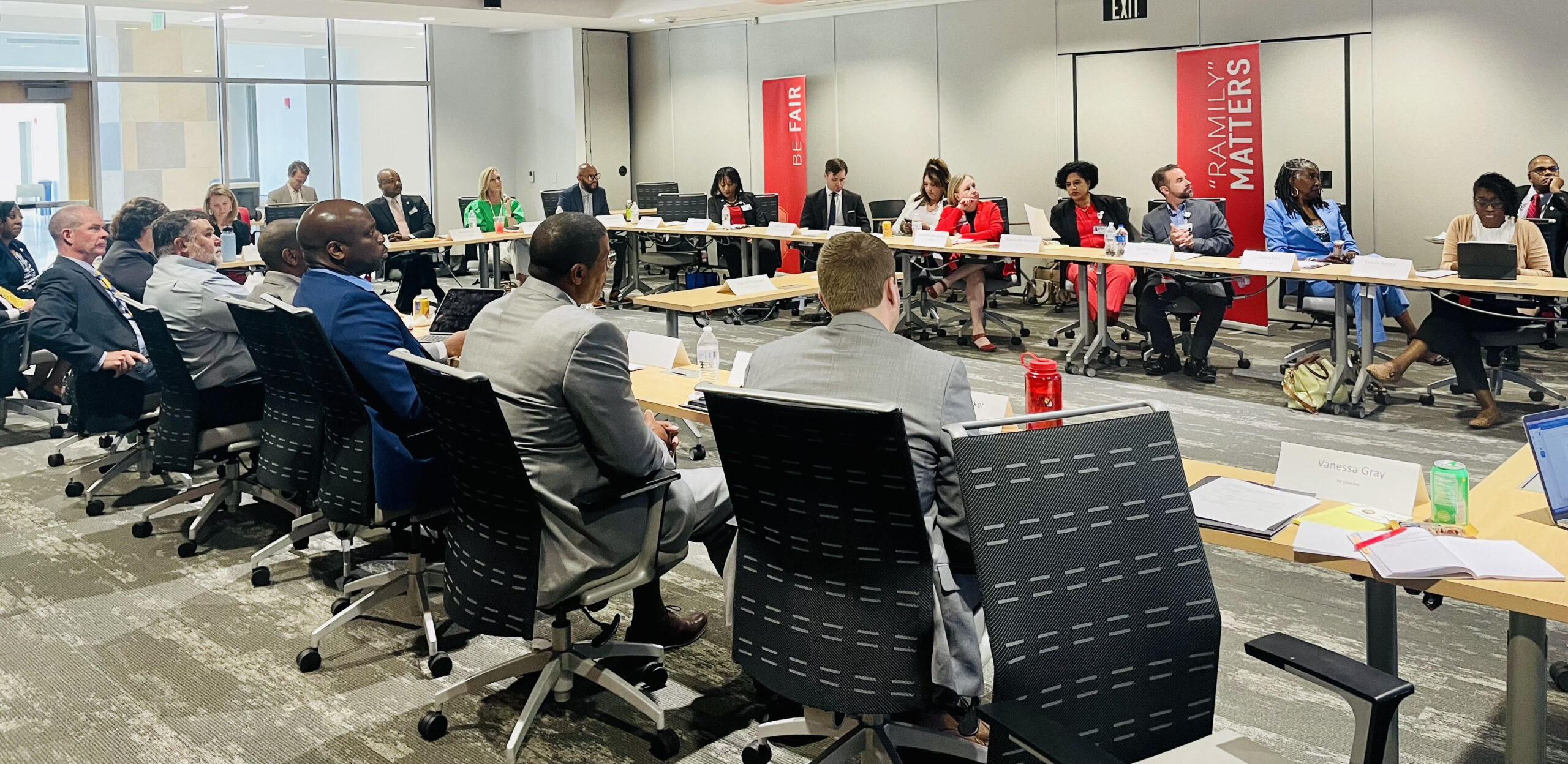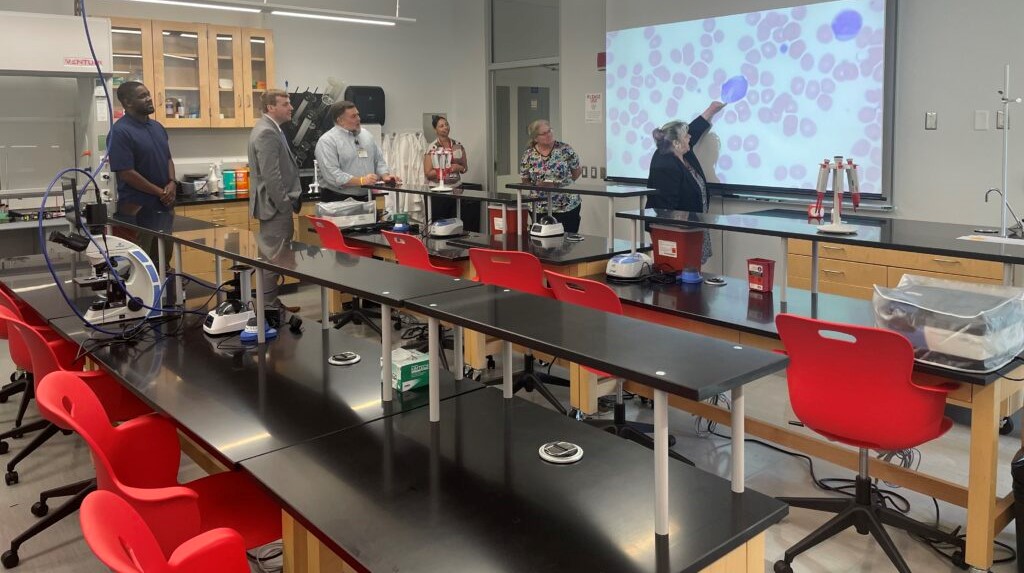Triad HBCU: Solving Health Care & Biomanufacturing Personnel Shortages with Strategic Business Alliances

North Carolina will need more than 17,500 more nurses over the next 10 years to keep up with the state’s aging and growing population. It is an unsettling statistic, and yet it is just one example of the acute health care and biomanufacturing personnel shortages facing our state.
This past Wednesday, the NC Chamber Foundation and myFutureNC, in partnership with CREED-NC, the Hunt Institute, and EdNC, convened leading employers in health and biomanufacturing, area health systems, and key partners at Winston-Salem State University (WSSU) where university leadership discussed how health care and biomanufacturing organizations can work together to build mutually beneficial workforce alliances. WSSU, a publicly accredited historically black college and university (HBCU), is one institution emerging as an innovation-focused education leader looking to help fill these most critical workforce needs.
The Value HBCUs Play in Our Future Workforce
HBCUs generate approximately $14.8 billion in economic impact and 134,090 jobs for their local and regional economies each year.
And while they account for just 3% of all higher-education institutions, they are responsible for producing 1 out of every 4 African American STEM graduates. WSSU is one such HBCU focused heavily on STEM and is receiving national recognition for its innovative practices. In 2022, WSSU also made a significant transition from a regional brand to a national one, ranking among US News & World Report’s Best Colleges and Universities.
“I used to hear students say we were their second or third choice—now I regularly hear that we’re their first choice [for college],” said Leslee Battle, dean of WSSU’s School of Health Sciences.
Employers who choose to make the investment in WSSU students can often count on them staying in North Carolina. According to university leadership, 93% of its nursing students, as an example, remain in the Triad-Triangle areas after graduation.

Power Skills, Real-Life Training, Innovation, and Technology
Dean Battle credits the university’s national accolades to its curriculum shift from soft to “power skills.” This learning approach is rooted in critical thinking, problem solving, entrepreneurial spirit, and immersion in real-world experiences. She said utilizing “innovation as a vehicle for change” serves as a guidepost for the department to stay future focused. In terms of businesses’ role in that innovation, she explained that they need direct engagement and feedback in order to stay cutting edge in curriculum and technology.
In just the last month, WSSU became the first HBCU in North Carolina to begin using virtual reality learning among its nursing students. Battle says this way of learning “surpasses traditional simulation because it allows for a two-way dialogue” between students and virtual doctors and patients. Additionally, as hospitals have become more centralized, the university recognized that students were having trouble obtaining the necessary clinical experience, and therefore made the decision to build an on-campus clinical site, which will be ready in time for the fall 2023 semester.
In 2021, the university also became the first HBCU in the nation to offer a physical therapy residency program.
The department’s innovative track record extends well beyond training health care personnel into all programs, including biomanufacturing. In what will be a four-year project, WSSU is creating a robust biomanufacturing training hub that will produce nearly 50 trainees per year. Its staff are also taking on future-focused projects, such as botany professor Rafael Loureiro and several students who are currently focused on analyzing phytohormonal data and microbial-plant interactions to assess viability for growing crops on the moon and Mars. It is work that has earned them national and international accolades.
Winston-Salem State University’s current Medical Laboratory Science Program is already the largest contributor of minority graduates to the laboratory workforce in the state of North Carolina, and in the past three years, over 90% of WSSU MLS graduates have found jobs within six months after graduating.
Creating Mutually Beneficial Alliances
During his presentation, University Provost Dr. Anthony Graham spoke about the importance of establishing strategic education-company alliances, explaining that they are deeper than traditional partnerships. Both he and Manju Bhat, dean of the College of Arts, Sciences, Business, and Education, called on the employers in the room to work with them in helping WSSU students be workforce ready, providing numerous examples of what those alliance opportunities could be, including:
- STEM scholarship programs
- Bridge programs
- Paid internship opportunities
- Clinical experiences for STEM students
- Professional development and networking
- Career preparedness
- Employment pipeline programs
- Mentorship opportunities, and
- Curriculum planning
Dean Bhat provided further context explaining the financial and educational disparities that traditionally exist among HBCU students including their own—as many of the university’s students are often first-generation college students. He explained that students in heavily low-income, predominantly minority areas typically do not have equal access to educational resources and classes that help prepare them for STEM degrees. These students need additional financial and educational support, which Bhat explained can come in the form of more paid clinical internship as one example.
Are you a business interested in forming an alliance with WSSU?
In conclusion
The Foundation would like to thank myFutureNC for their leadership in coordinating this initiative. Collectively, we are already brainstorming and looking ahead to future HBCU-business convenings to continue this important series.
Lastly, we also want to thank the Triad-area and state hospital systems, health and biomanufacturing companies, and key partner organizations who joined us last week for this important conversation. Those organizations included:
Event Attendees Included:
| Hospitals: | Companies: | Key Partners: |
| Atrium Health | Lutheran Services Carolinas | CREED-NC |
| Cone Health | Merck | EdNC |
| Duke Health | Pfizer | Health Care Facilities Association |
| Novant Health | Hunt Institute | |
| Wake Forest Baptist Hospital | John M Belk Endowment | |
| myFutureNC | ||
| NC Biotech | ||
| NC Chamber | ||
| NC Chamber Foundation | ||
| Northwest AHEC & Wake Forest School of Medicine |